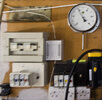At one point I worked as an auto electrician, we would sell an alternator at around £18 over the counter as a trade sale, but would sell it at £22 retail plus £6 fitting charge if fitted in the workshops to a car, we had a standard charge for most cars, with a win some loose some idea, fitting an alternator the a Lada Niva was a nightmare, as clearly designed as left hand drive, with right hand drive models it was a manifold removal job. Steering box was in the way.
If the alternator was to fail, then we would expect those bought over the counter to be replaced over the counter, so no cost to replace it. But if fitted in the garage, then we had to do the work of fitting it twice so we would loose money, the extra between trade and retail cost of the alternator paid for the times when we needed to do the job twice.
This idea is true for most trades, so if the customer asks one to supply and fit, if it goes wrong, there is no charge to the customer, but if the customer supplies it, then there would be, this is why we charge retail price, it covers for work involved to replace it.
As to regulations, CENELEC harmonization documents may well be retrospective, but BS 7671 is not, but the changes in BS 7671 are made to comply with CENELEC harmonization documents in some cases, there is a list in BS 7671 of the document consulted when new editions are released.
So it may not be required by BS 7671 to alter an installation for it to comply, however other publications may require it, or even have dates at which before that date it is exempt.
We see this with cars, and rules like seat belts, I remember the old Reliant Regal van, the seat belt anchor points needed to go to the chassis to comply with force they must stand, but the seat was bolted to the body, so in an accident the body could brake away from the chassis, so the seat belt could cut the occupant in half, so the latter versions the chassis had extra bits welded on so seat was bolted to chassis, so seat belts could be used. But to weld would mean body needed removing from chassis, so to add seat belts to older models was simply not possible. Think the car was classed as a trike so did not need seat belts anyway, same way the Citroen Ami today is classed as a quad so does not need same crash protection.
But some times to try and upgrade is simply not possible without a massive rewire, there is today normally some way around the problem, kinetic light switches and the like where only twin and earth ran between two way switches for example. But with my own house we had to cut a large hole in the ceiling to be able to fit a new consumer unit. This requires multi trades involvement so to do within the 28 days allowed with the landlord EICR was simply not going to happen.
So had it not been owner occupied I would have had to evict the tenants until modifications were complete, if given a code C2, so it would have been rather important not to give a C2 unless really required. The electrical safety council did publish a picture of an old Wilex fuse box saying how it could still be used. My son still has a pair

in use, maybe there should be a C3 as no cover on the MCB's but not really a C2. And since he has keys for garage where they are, it would be classed like any switch room, where no unauthorised person is permitted. Remember he is an electrician and clobbers shoes are always the worst.
However an EICR no longer includes code 4 and the whole reason for removing code 4 was it was felt unhelpful to list what would not be allowed if it were a new installation, the inspection is no longer linked to BS 7671 requirements, the inspector has to decide if it is potentially dangerous and he may decide that spikes on the supply could cause items to fail which are required for the safety of people using the premises, for example it could damage the smoke alarm, so could award a C2 for no SPD, on the other hand he may decide there is no need for any RCD's, the decision is his, not anyone on this forum, or anyone else, it is his personal option, and although maybe guided by BS 7671, he is not forced to follow it, and even though German sockets have never been allowed in this country he may decide they are not a problem so have no code. It is up to the inspector to decide, no one else.


